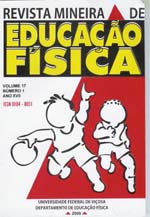PLAYING TO LEARN OR LEARNING TO PLAY: A CASE STUDY IN A SPECIALIZED SCHOOL IN FUTSAL OF DIAMANTINA/MG
Keywords:
futsal, teaching-learning process, methodAbstract
Futsal has definitely won a spot in Brazilian culture, and in this popularity scenery, it becomes necessary to investigate subjects related to the initiation of children in this sport. In this sense, the discussions and productions concerning methodological issues linked to the teachinglearning process gained more space. Thus, the present study aimed to verify which methods are used in the teaching-learning process of futsal in a specialized school of Diamantina / MG , with children from 9 to 10 years old, seeking to identify if they learn to play (analytical-synthetic method) or playing to learn (global functional method). This was a nonparticipant observational study, in which, for the development of the field study, 14 classes were observed. During the observation of classes, the researchers wrote down in a form the activities developed by the coach/teacher in order to qualify them as belonging to analytical-synthetic or global functional methodological principle. It was found that the analytical-synthetic method was the only one used in classes held on Thursday (first day of weekly training) and on Saturdays (second day of the weekly training ) predominated the formal game (scrimmage) not being observed any activity linked to global functional method. It is concluded based on the observations performed, that in the school researched there is the belief that students must learn the fundamental skills techniques of futsal alone, then apply them in the context of formal game; yet , it is worth highlighting the lack of activities and fun games during all classes - a fact that is considered negative when the focus is on sports initiation with children.
Downloads
References
BALZANO, O. N. Polígrafo pedagógico de futsal. 1.ed. Canoas: Unilasalle, 2006. 92 p.
CORREA, U. C.; SILVA, A. S.; PAROLI, R. Efeitos de diferentes métodos de ensino na aprendizagem do futebol de salão. Motriz, Rio Claro, v. 10, n. 2, p.79-88, mai./ago. 2004. Disponível em <http://www.rc.unesp.br/ib/efisica/motriz/10n2/10CCU1_home.pdf>. Acesso em: 9 ago. 2010.
FREIRE, J. B. Pedagogia do futebol. 2.ed. Campinas/SP: Autores Associados, 2006. 98 p.
GARGANTA, J.; PINTO, J. O ensino do futebol. In: GRAÇA, A.; OLIVEIRA, J. O ensino dos jogos desportivos. 3. ed. Santa Maria da Feira: Rainho & Neves, 1998. p. 95-136.
GRECO, P. J. Iniciação esportiva universal: metodologia da iniciação esportiva na escola e no clube. Belo Horizonte: Ed. UFMG, 1998. v. 2. 305 p.
LUCENA, R. F. Futsal e a iniciação. 6. ed. Rio de Janeiro: Sprint, 2002.103 p.
MUTTI, D. Futsal: da iniciação ao alto nível. 2. ed. São Paulo: Phorte, 2003. 306 p.
REZER, R. A prática pedagógica em escolinhas de futebol/futsal: possíveis perspectivas de superação. 2003. 194 f. Dissertação (Mestrado em Educação Física) – Centro de Desportos, Universidade Federal de Santa Catarina, Florianópolis, 2003.
SANTANA, W. C.; PINTO, F.S. Iniciação ao futsal: as crianças jogam para aprender ou aprendem para jogar? Revista Digital, Buenos Aires, n. 85, jul. 2005. Disponível em: <http://www.efdeportes.com/efd85/futsal.htm>. Acesso em: 10 set. 2010.
SANTANA, W. C. Futsal: apontamentos pedagógicos na iniciação e na especialização. 2. ed. Campinas: Autores Associados, 2008. 146 p.
Downloads
Published
How to Cite
Issue
Section
License
Os artigos submetidos e publicados são de inteira responsabilidade de seus autores, não refletindo necessariamente a opinião do Comitê Editorial. A revista se reserva o direito de efetuar, nos originais, alterações de ordem normativa, ortográfica e gramatical, com vistas a manter o padrão culto da língua, respeitando, porém, o estilo dos autores. O manuscrito submetido deve ser original, não podendo ter sido publicado em qualquer outro veículo de informação científica, e nem submetido para publicação em outra revista científica. Os trabalhos publicados passam a ser propriedade da revista Mineira de Educação Física, ficando sua reimpressão total ou parcial de acordo com a licença Creative Commons Attibution 4.0. Deve ser consignada a fonte de publicação original. Os originais não serão devolvidos aos autores. As opiniões emitidas pelos autores dos artigos são de sua exclusiva responsabilidade.





 Esta obra está licenciada com uma Licença
Esta obra está licenciada com uma Licença 